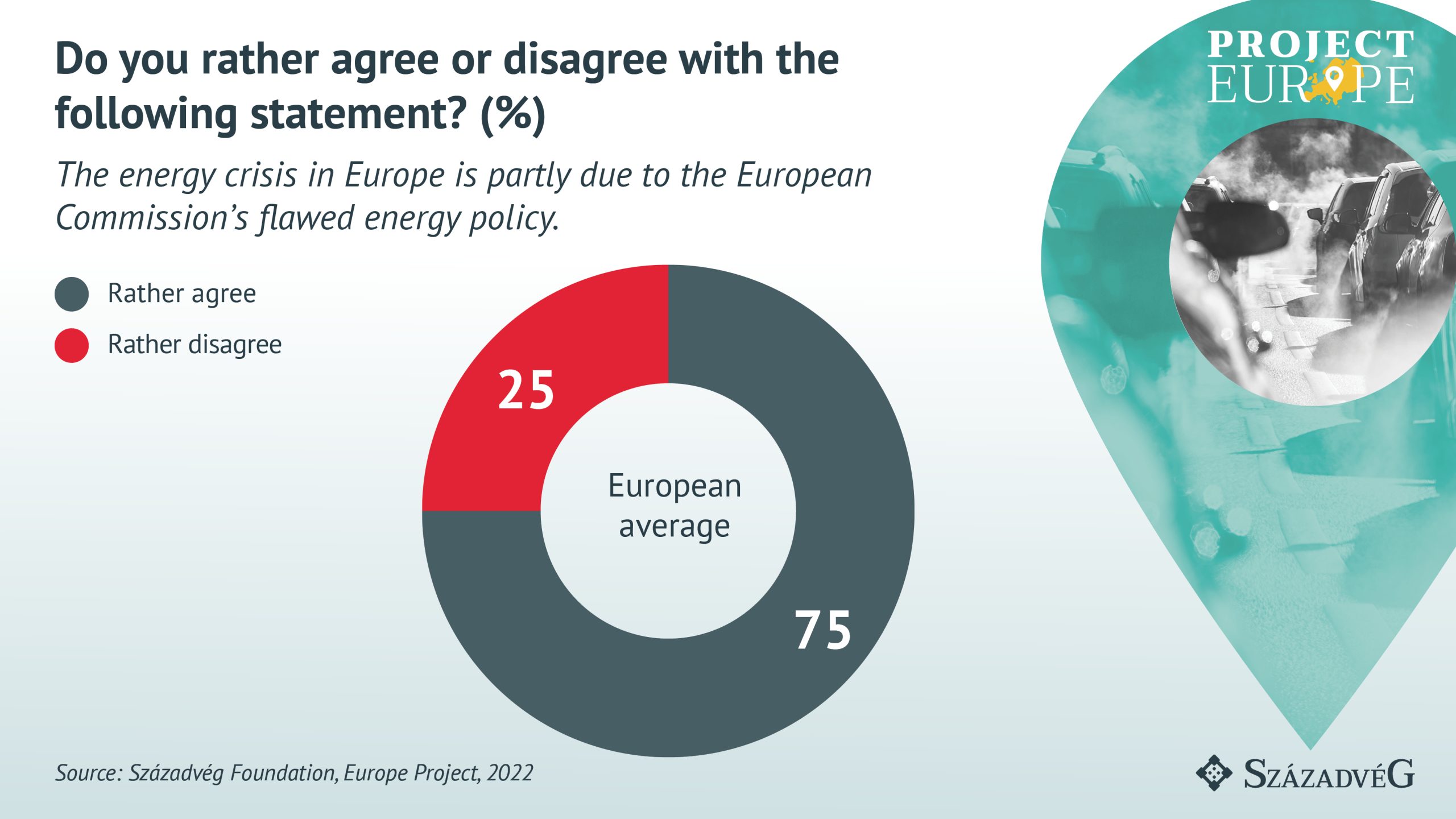In its guidelines issued over the last ten years, the European Commission has sought to encourage market actors to drastically transform the energy mix by downsizing traditional forms of energy production and deregulating retail prices. The package of proposals entitled “Fit for 55” and issued by Brussels on 14 July 2021, would enhance earlier efforts to bring about faster and drastic changes in the energy market by making a stronger distinction between energy production technologies and by taxing household energy consumption. Following the failure to have the package adopted by the leaders of the Member States after the energy crisis that broke out in the autumn, the Commission has now included it into its draft proposal for addressing the Russian-Ukrainian conflict. Századvég surveyed whether European public opinion holds Brussels responsible for the energy crisis and whether it supports the most controversial proposal for a household carbon tax included in the “Fit for 55” package.
Brussels’ flawed policy is partly responsible for the energy crisis
The “Fit for 55” package of proposals has already divided Member States since its publication, and tensions have further increased following the outbreak of the European energy crisis. Officials in Brussels (and some Member State leaders) saw the price explosion in the autumn as a short, temporary anomaly. According to them, Brussels’ previous decisions on energy policy were not responsible for the situation and, in fact, the price increase showed that the “Fit for 55” package of proposals, in its current form, should be adopted and implemented as soon as possible. However, another part of the Member State leaders considered that the crisis had highlighted the structural problems of the European energy market: the direction of the common policy needs to be changed and the package of proposals should therefore not be adopted.
The six months since the outbreak of the energy crisis have proved that the price increase in the autumn was not just a one-off anomaly: record prices in October were toppled in December and March. However, it is still debated whether previous energy policy efforts have contributed to the situation and whether it is necessary to change them. Research by Századvég shows that three-quarters of Europeans with an opinion say that the European Commission’s flawed energy policy is partly responsible for the crisis.
The proportion of those who say that the crisis is partly the result of the policy in Brussels is higher in every Member State than those who say there is no connection between the two. The above statement was strongly agreed in Bulgaria (83 percent), Portugal (81 percent), and Slovenia (81 percent), followed by Belgium (61 percent), Luxembourg (56 percent), and Denmark (55 percent). In Hungary, two-thirds of respondents think that the European Commission’s flawed energy policy is also responsible for the situation. Results show that the majority of the European population agree with the leaders of the Member States who are calling for a change in central energy policy.
European households reject Brussels’ carbon tax proposal
The most controversial measure included in the “Fit for 55” package of proposals is a new central carbon tax that would place a burden on the population regarding their buildings and vehicles, and through which Brussels would force households to reduce their energy consumption. Some Member States, including Hungary, had already protested the intervention when the package was announced, and since then, in most European countries, household overhead costs have significantly increased, leading to an increase in the number of Member States rejecting carbon tariffs. However, Brussels continues to insist on the measure, which is mainly due to the fact that the intervention would provide it with new central revenues, making it independent from the influence of Member States in terms of funding. The survey of Századvég shows that 69 percent of European citizens with an opinion do not support Brussels’ new central carbon tax proposal.
The majority of respondents rejected the measure in all Member States. The intervention was the most rejected by the respondents in Hungary (84 percent), Croatia (83 percent), and the Czech Republic (81 percent), while it was the least rejected in Portugal (53 percent), Denmark (53 percent), and Luxembourg (51 percent). Based on the results, it can be stated that the carbon tax proposed by Brussels does not have sufficient support in the European Union, so the measure should not be introduced.
In the first half of 2016, the Századvég Foundation conducted a public opinion poll survey covering all 28 European Union Member States, with the aim to analyse the opinions of EU citizens regarding the issues that most affect the future of the EU. In a unique way, Project28 conducted the widest possible survey of 1,000, that is a total of 28,000 randomly selected adults in each country. Gaining an understanding of society’s sense of prosperity and mapping the population’s attitudes towards the performance of the European Union, the migration crisis and the increasing terrorism were among the most important goals of the analysis. Following the survey in 2017, 2018 and 2019, Századvég Foundation, on behalf of the Hungarian Government, has been conducting research under the name of Europe Project since 2020, which continued to reflect on the topics that most determined the European political and social discourse.
In 2022, the aim of the survey is again to map the population’s attitude towards the most important public issues affecting our continent. In addition to society’s sense of prosperity, the performance of the European Union and the attitudes towards the migration crisis, in line with the latest challenges affecting Europe, the dominant theme of this year’s poll is the coronavirus pandemic, climate change, energy supply and family policy. In addition to the European Union Member States, the 2022 research covered the United Kingdom, Norway, and Switzerland, interviewing a total of 30,000 randomly selected adults using the CATI method between 3 January and 14 February.


